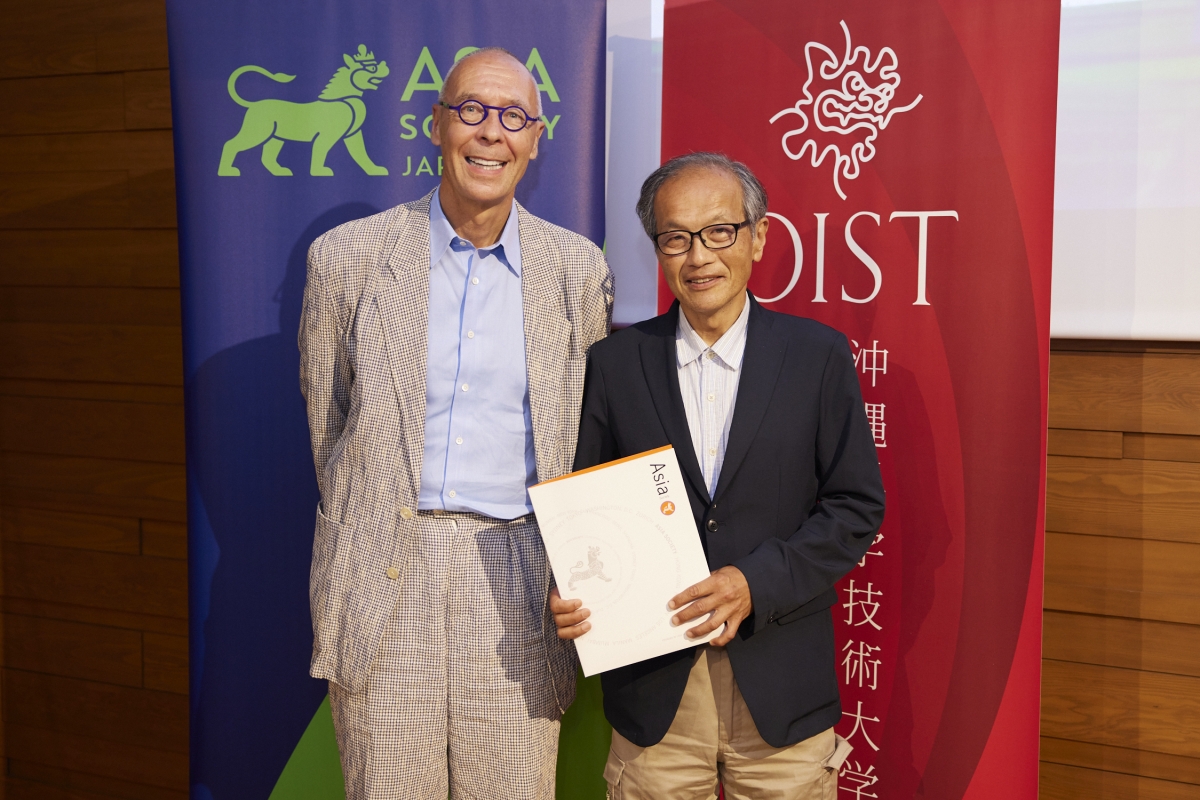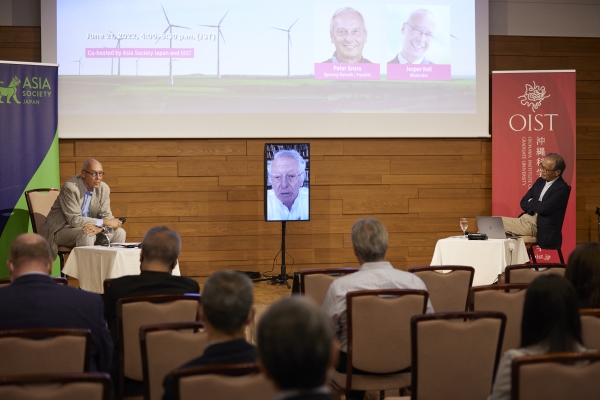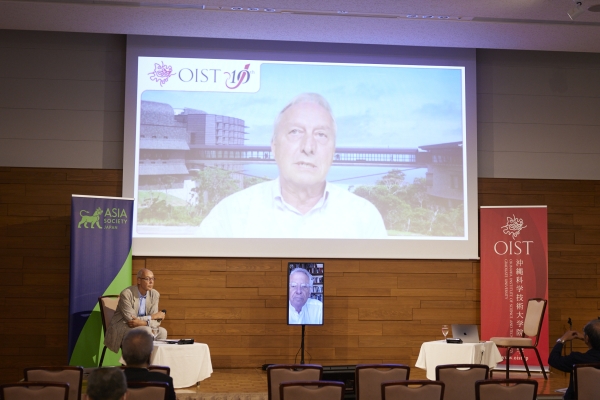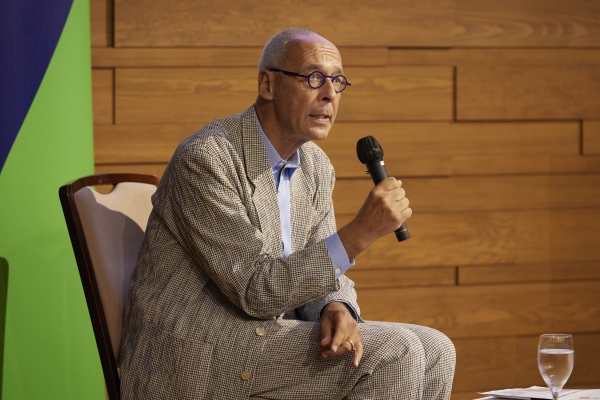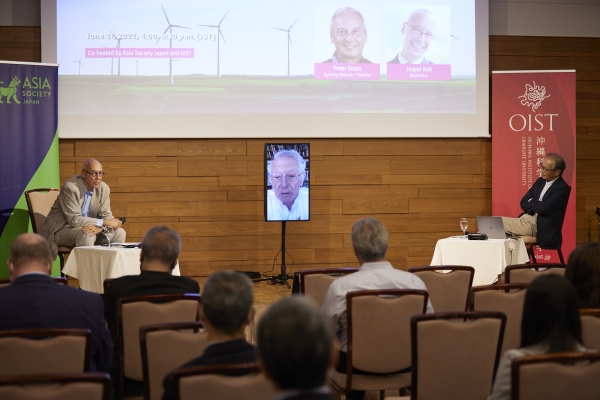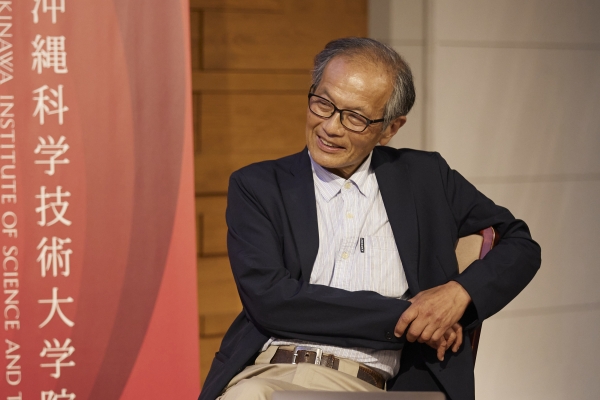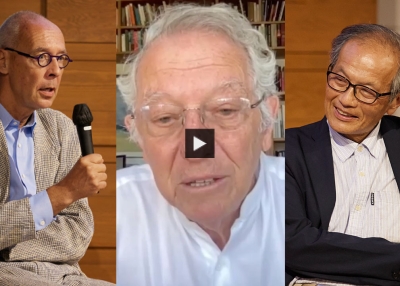Climate Change: The Need for Action Now (Recap)
On June 21, 2022, a panel of energy and climate experts discussed the urgent need for actions on climate change. The panel featured David King, former chemistry professor at the University of Cambridge, who explains the current climate conditions and his “climate repair” strategy called Reduce, Remove, and Repair; and Jun Arima, professor at the University of Tokyo, who dives into the obstacles worsened by COVID-19 and the war in Ukraine, and the international collaboration necessary for future climate stability. Peter Grass, president and CEO of OIST, delivered the opening remarks, while Jesper Koll, policy committee chair at Asia Society Japan, hosted the program.
The biggest threat of the century
In his opening remarks, Dr. Peter Gruss highlighted that we all share the common belief that climate change is the biggest threat of the century. The Ukraine crisis has forced Europe to cut down on its natural gas supply, which has ironically been replaced by coal in some countries. Nuclear power has not proven to be the solution. Introducing Sir David King, he asked Sir King to provide his insight on how to repair the mess that humans have made.
Sir David King offered comments on how critical climate change and its consequences are today and strategies for a brighter future. He was in the driving seat of developments that led to the conclusion of the Paris Agreement in 2015. He had already been convinced at the time that global warming should be limited to 1.5℃ relative to preindustrial levels, but regrets to say that he has changed his mind – the world has already entered the stage he had wished to avoid. He is concerned that there is very limited discussion on “tipping points” today.
Crossing the tipping point
The Climate Crisis Advisory Group, an independent group of scientists brought together by Sir King, published a report attributing the extreme events that occurred in 2021 to the crossing of a tipping point in sea ice melting. A great amount of methane is trapped in the ice in the Arctic region in the form of methane hydrate. We have tended to ignore the impact of methane, which has a half-life of 10-12 years. However, it is being released into the atmosphere faster than it is being removed. Methane is 130 times more potent as a greenhouse gas than carbon dioxide and it is contributing to temperature rise at a faster pace than anticipated. Across the Russian tundra, crater explosions have been observed, being the result of permafrost melt leading to the released gas explosion from the soils.
Recent warming trends in the Arctic have greatly affected the Arctic jet stream, especially disturbing the northern hemisphere weather systems. Extraordinary local extreme temperatures were seen in the Pacific Northwest and Canada, as well as snow in Texas.
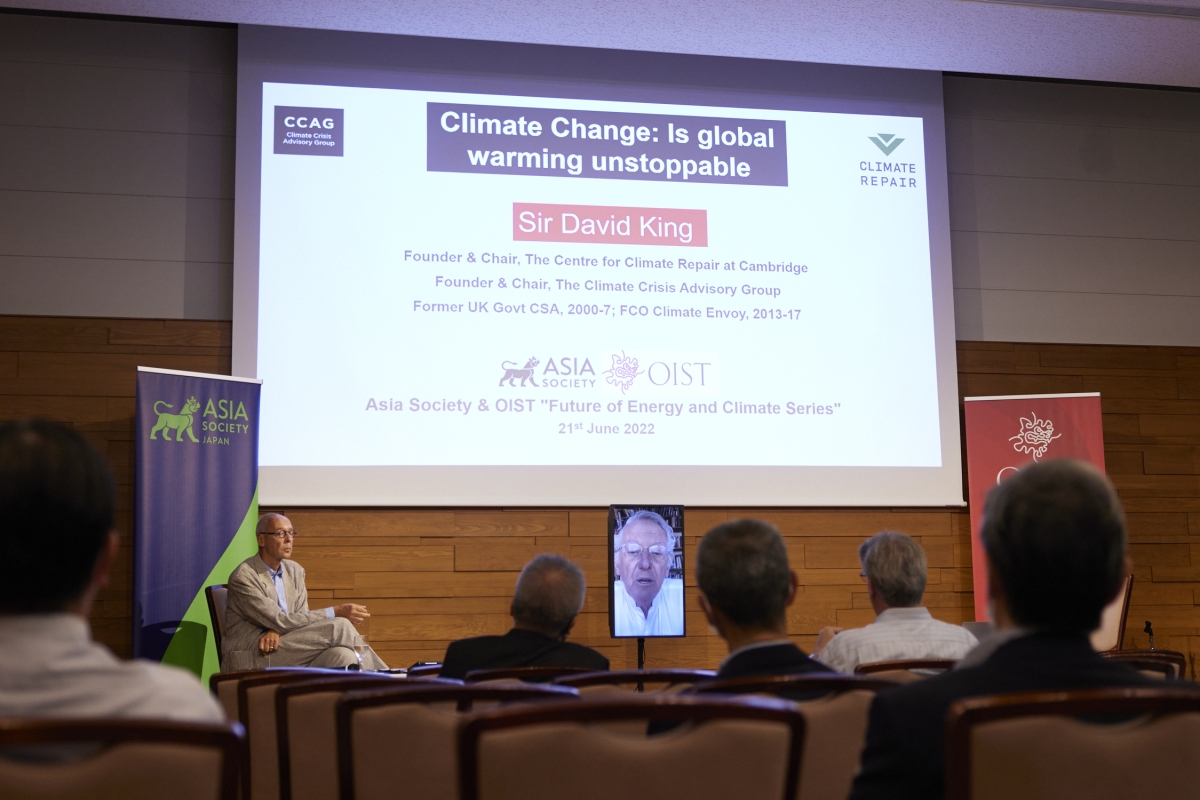
Regions most at risk
According to the Intergovernmental Panel on Climate Change (IPCC), Greenland ice is melting irreversibly. The global average sea level will rise by 6.5 meters if Greenland ice melts completely. And well before that happens, we will no longer be able to live in our coastal cities.
Southeast Asia, including a large portion of the Mekong Delta, will be under water at high tide in once-a-year flooding in 2050. This not only means increased migration but also losing major rice production for the whole world.
Detailed strategies
Sir David King founded the Centre of Climate Repair at Cambridge University with three main strategies: 1) reduce deep and rapid emissions; 2) create new GHG sinks and remove excess greenhouse gases from the atmosphere; and 3) repair the North Pole regions and ice on land by refreezing the Arctic.
There is no carbon budget left. Every ton emitted today has to be removed to create a manageable future. Even rapid reduction needs to be done in an orderly transition to reduce the impact on humanity. Net zero 2050 is a starting target and wealthy parts of the world and non-wealthy regions, especially in Africa need to collaborate to achieve rapid emissions reductions.
Bilateral agreements are critically important. The UK is the only country that has established 165 climate attaches in embassies around the world. This was done to support bilateral agreements on actions to deal with the climate crisis.
Sir David’s best example of willing nations working together to find a way out of our crisis is Mission Innovation, stimulated by Sir David outside the COP process when he was in the Foreign Office. With 22 nations, including the US, China and India, committed to doubling by 2020/2021 annual public spending on innovative technologies to approximately 30 billion USD, the idea was to de-risk for the private sector the opportunities emerging in the race towards a decarbonized future.
Marine Biomass Regeneration is also a promising process that can remove greenhouse gases at scale while also increasing fish and marine mammal populations in the ocean. It imitates the natural ocean fertilization processes, mimicking the distribution of whale faeces. It follows a recent understanding of the baleen whale feeding on krill in the depths of the ocean and surfacing to excrete in the sunlit areas of the oceans.
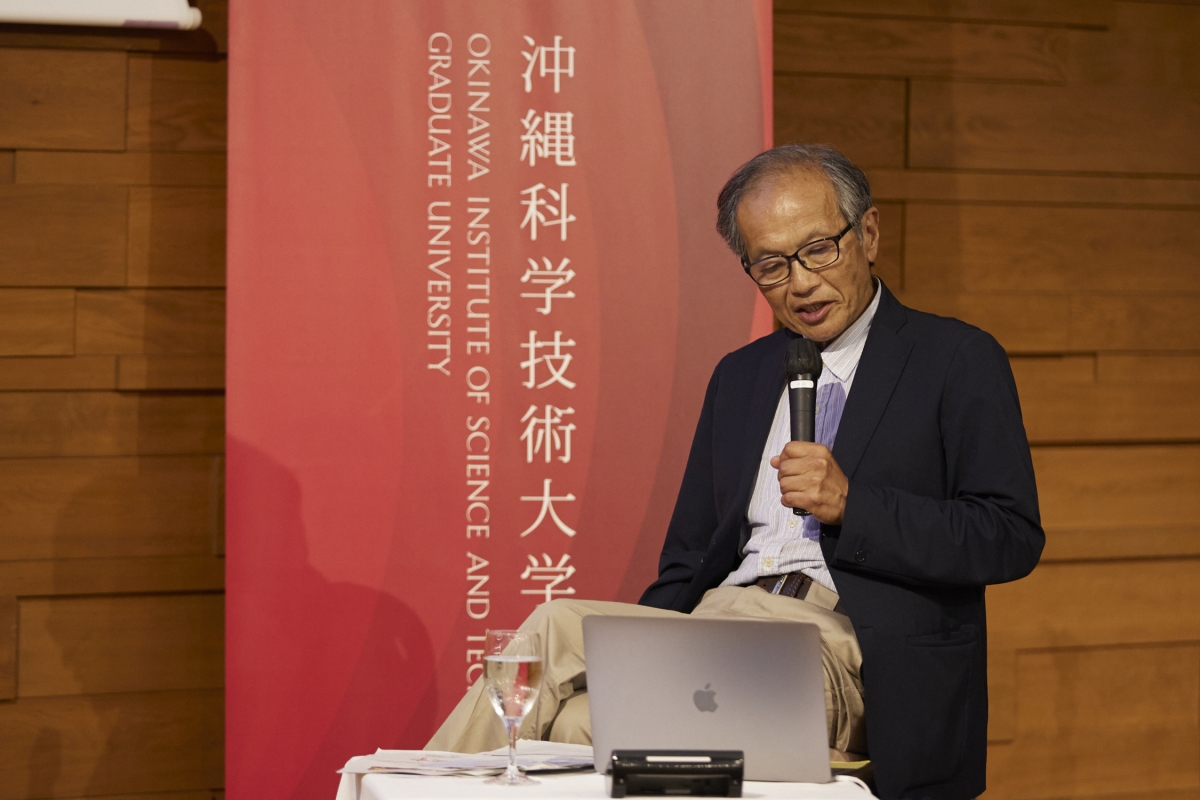
Following Sir David’s initial comments, Prof. Jun Arima offered his insight on the challenges of achieving deep and rapid emission reductions under current economic and geopolitical circumstances. According to the UNEP Gap Report, the emissions gap between NDCs and Paris 1.5 Pathways will be 29-32 Gt in 2030. A 45% reduction by 2030 calls for annual reductions of 7.3% from 2022 to 2030, which exceeds the 5.8% reductions achieved in 2020 amid the COVID-19 crisis. Asian countries obviously hold the key in the global endeavor towards decarbonization, but China will only peak out in 2030 and emissions will continue in India and ASEAN economies beyond 2030. Another challenge is the priority gap regarding the SDGs among these countries; climate action is not a priority agenda in most developing countries.
High energy prices are not politically sustainable. Polls have shown that 7 out of 10 Americans believe that climate change is a reality by being unwilling to pay for increased energy bills.
The UK efforts at COP26 are laudable but the Glasgow Pact appears to have changed the nature of the Paris Agreement which featured a good balance between a top-down global temperature goal and bottom-up NDCs.
The 1.5 degrees target and carbon neutrality in 2050 have placed a cap on our carbon budget. This will intensify competition over limited carbon space between developed and developing countries. While the political narrative about climate change will not change, the momentum could be reduced in the real world amid the Ukraine war and the imminent risk of stagflation of the global economy. Climate change issues cannot be detached from geopolitics and geo-economics. The ongoing gas price hike amid the Ukraine Warcould discourage countries from switching from coal to natural gas, the low-hanging mitigation opportunity; therefore, coal may stay longer in the Asian energy mix than previously expected.
While international collaboration is needed, we are currently moving toward a more divided world. The Ukraine War has become a wake-up call for pursuing a well-balanced energy policy. Prof. Arima agreed that innovative technologies are crucial and admired Sir David’s initiatives, including Mission Innovation.
Panel discussion
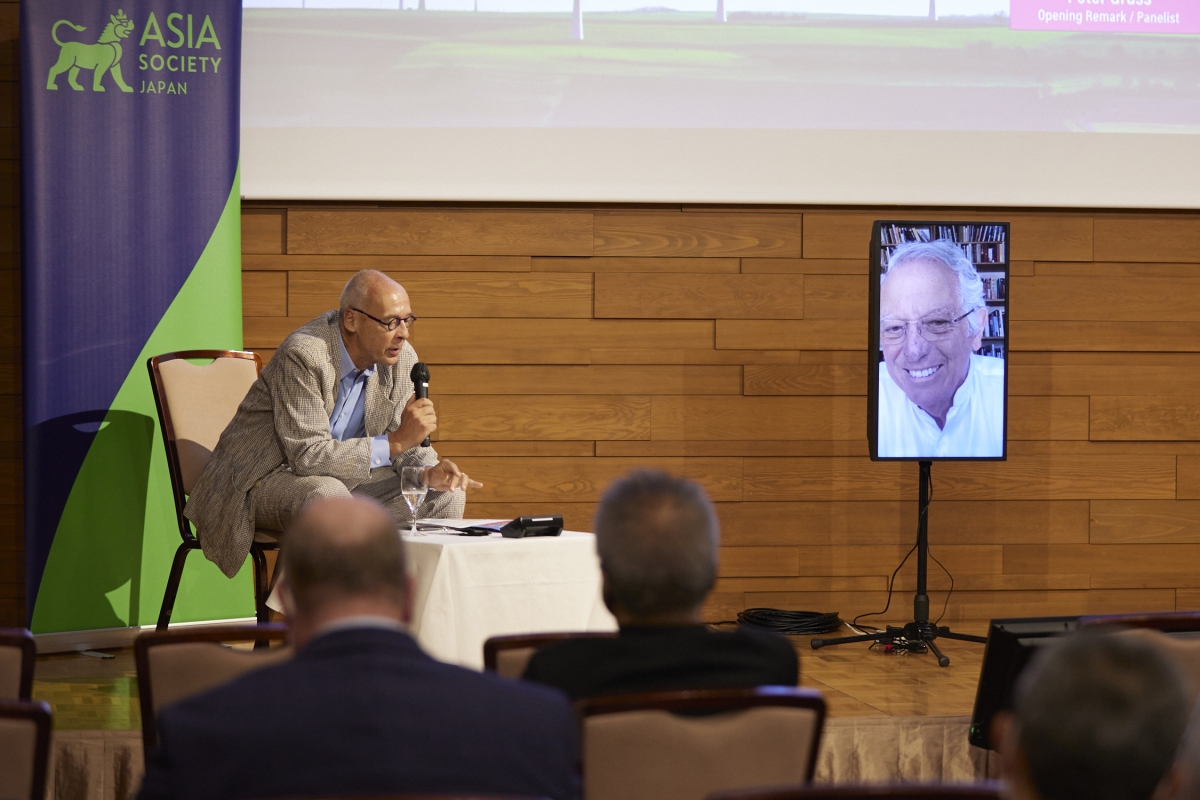
Moderator, Mr. Jesper Koll initiated the discussion by asking Sir David how worried he was about the new global reality, or “divided world.” Sir David commented that Prof. Arima’s message generally said that humanity cannot expect to survive in our present form. However, extreme weather events are impacting the entire world and we need the willingness to understand the challenges that humanity is facing.
Sir David pointed out that Prof. Arima missed the point that the whole world has benefitted from dramatically reduced renewable prices that were initially unforeseen when the feed-in-tariff scheme was first launched in Europe. It is now as economically advantageous to build a new renewable power plant as it is to build a new coal-fired power plant.
The developed-developing country issues are rooted in the distrust developing countries share toward developed countries. Their claim is: “You created the problem. Please help us. And what are you doing to make the situation better?” The developed world has failed with no real leadership from the US on this issue. We urgently need to recover our trust.
Prof. Arima agreed that we needed to understand the magnitude of the challenge. He emphasized that at the same time, we needed to acknowledge the political and economic reality. We need to live with the political reality presented in public opinion. Renewables alone cannot be the solution but need to be considered with issues such as integration costs. Each country has different constraints and priorities. Asian policymakers are more interested in the affordability of energy. Carbon border adjustment measures may pose even greater challenges, including a trade war. Avoiding carbon leakage and maintaining a level playing field will be another headache for policymakers.
Sir David asked that the reference to him as an idealist, as opposed to a “realist”, be withdrawn. He stressed that he was the one facing up to the reality of climate change, while Prof. Arima was only laying out the current situation.
Sir David also noted that while China has become the target of much criticism because of its absolute emissions, China has done more than any other country. One of the fastest growing economies in the world, China has a growing energy demand that they have largely met with renewables and nuclear power. The world is benefitting from China’s intensive activity to increase renewables and nuclear power. It will surely deliver on its promise to reach net-zero in 2060, or even much earlier.
